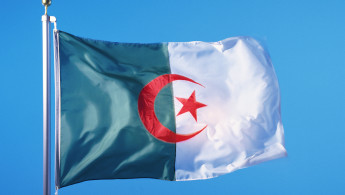Algerian authorities arrest Ihsane El-Kadi, director of last free media outlet in Algeria
Algerian authorities arrested renowned journalist Ihsane El-Kadi on Friday night at his home in Zemmouri, amid a continued crackdown on freedom of speech.
El-Kadi runs the independent station Radio M, which is widely considered the last space for free debate in Algeria.
The journalist's daughter, Tin Hinan El-Kadi, said on social media that a General Directorate of Internal Security (French acronym DGSI) brigade composed of six men in two vehicles had ordered him at half past midnight to follow them to a police station in Ben Aknoun, a suburb of Algiers.
Radio M's website reported that El-Kadi had received a call two hours ahead of his arrest asking him to report immediately to the station, but the journalist said that he was too far from the capital.
Mon père, @ElkadiIhsane, vient d’être interpellé de chez lui par une brigade de Antar. Six hommes dans deux véhicules sont venus à 00.30 lui demander de les suivre immédiatement à la caserne de Antar. Le harcèlement se poursuit.#الصحافة_ليست_جريمة pic.twitter.com/cn3ik44gDJ
— Tin Hinane El Kadi (@TinhinanEl) December 24, 2022
No official reason has been given for his arrest, however some observers have speculated that it may be related to a recent post on Twitter.
In his latest tweet, El-Kadi challenged President Abdelmadjid Tebboune's assertion about the recovery of $20 billion from oligarchs linked to late president Abdelaziz Bouteflika.
“The public treasury has recovered 20 billion dollars from the oligarchs of Issaba, said President Tebboune without batting an eyelid!!!! How dare you say something so mathematically crude to reputedly the best educated citizens in Africa?” he tweeted on Friday.
For the past three years, El-Kadi has faced relentless judicial harassment.
In June 2021, he was sentenced to six months in prison without a warrant for an opinion piece on the role of Islamists in the Hirak movement.
However, El-Kadi continued to express himself freely while much of the rest of the country's media was being reined in. Many Algerian journalists were forced to self-censor their writing for their safety.
"In recent years we have been forced into self-censorship. Journalists have been imprisoned for reporting. The pressures on media managers pushed us to be careful about what we write," Ali Boukhlef, an Algerian journalist told The New Arab.
In a press release, the board of directors of Interface Média, the agency that brings together Radio M and the Maghreb Emergent news website, said on 23 December that the authorities aim "today more and more clearly to take from us, by various means, our established status as an electronic press publisher".
"Our media platform has been undergoing for three years has no other basis than preventing the free exercise of the profession to inform," read the press release.
Journalists cornered
Three years after the pro-reform Hirak protests, Algeria remains a dangerous place to be a journalist.
Algeria is ranked 134th out of 180 countries on Reporters Without Borders' (RSF) 2022 World Press Freedom Index.
Algerian authorities are holding at least 280 activists and dozens of journalists in detention, mostly for defamation of politicians or because of posts on social networks.
After toppling the two-decade-long regime of Bouteflika in 2019, Algerians’ path to democracy was soon sabotaged by President Tebboune's fledgling regime.
In addition to a crackdown on freedom of speech, financial hardships over the last twenty years have pushed many titles, including Liberté, Le Matin, La Tribune and the weekly La Nation, to close due to a drop in advertising revenue and sales.
El-Watan, the most widely printed Francophone newspaper in Algeria, recently released a statement predicting that its closure is only "a question of time" due to rising political pressure and economic difficulties.
"The majority of the media [in Algeria] can no longer provide a decent living for journalists," lamented Boukhlef.





 Follow the Middle East's top stories in English at The New Arab on Google News
Follow the Middle East's top stories in English at The New Arab on Google News


